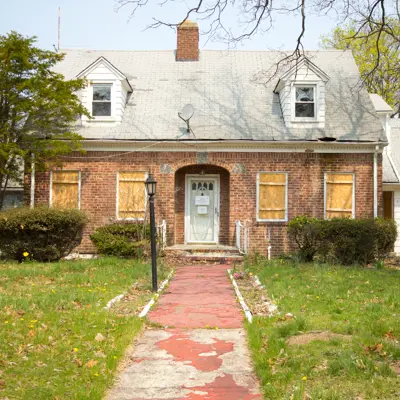NYSAC Blog
NY Foreclosure Rules in Play After SCOTUS Ruling
By Joe Mahoney, Contributing Author
At her office in Monticello, Sullivan County Treasurer Nancy Buck is worried the county's next auction of tax delinquent properties will result in a net loss due to significant expenses arising from postage costs, title searches and advertising requirements.
Her department has also purchased software to manage the data, and then there are all the staff hours involved in trying to put those parcels back on the tax rolls so they don't become a drag on other taxpayers.
"It's a lot of work," Buck said.
State law allows county governments to publicly sell at auctions properties to recover the delinquent taxes.
But local governments in New York, along with 10 other states and the District of Columbia, are grappling with a new wrinkle sparked by a May 25 U.S. Supreme Court ruling in a case arising from Minnesota: Tyler v. Hennepin County. The high court ruled it is unconstitutional for municipalities to unilaterally retain the surplus monies generated from tax lien foreclosure sales.
The property owner who challenged the Minnesota scheme, 94-year-old Geraldine Tyler, had accrued about $2,300 in unpaid property taxes and $13,000 in interest and fees.
After Hennepin County sold the property at auction for $40,000, it did not allow the former property owner to recover any of the approximately $25,000 in surplus funds. Instead, it split the funds with itself, the local town and school district.
Tyler alleged Hennepin County retained the excess value of her home above her tax debt in violation of the Takings Clause of the Fifth Amendment and the Excessive Fines Clause of the Eighth Amendment.
The Hennepin decision had an immediate impact on New York counties seeking to recover unpaid property taxes as Article 11 of the Real Property Tax Law had allowed them to keep the surplus proceeds from the sale of tax delinquent properties.
County Taxpayers on the Hook
Under current law, when a property owner fails to pay taxes, counties must pay other taxing jurisdictions (cities, towns, villages, and schools) for any tax delinquent properties. They are on the hook for millions of dollars annually.
In 2022, New York counties collectively budgeted more than $100 million to cover the losses from delinquent taxes. "We expect that to double or triple under Hennepin," Lucas said.
Some counties experience little interest in the sale of delinquent properties end up having to write off losses when the sales prices are below what is owed in taxes and penalties. Prior to the Hennepin ruling, keeping the surplus from sales that more than cover the delinquency sums was seen as a way to offset those losses.

Many tax delinquent properties have significant liabilities – like the need for environmental remediation – associated with them, which make them difficult to sell at auction.
Counties not only lose tax revenue from these properties but must also make other municipalities whole every year for what they are owed on these parcels.
"The only choices now are to either sell it at a loss or sell it at a breakeven point," said Saratoga County Treasurer Andrew Jarosh. "There's no third option, which means over time, it's going to average to a loss for the county,"
Meanwhile, he added, counties are forced to absorb the administrative costs stemming from the efforts to market and sell the properties while meeting the notification and advertising requirements.
"How do we accommodate that, because what that is going to do is put further financial strain on the counties," Jarosh observed.
Oswego County Treasurer Kevin Gardner, now the president of the treasurers association, estimated his county spent some $100,000 in administrative costs for its most recent property auction.
“This is an important tax policy that needs to be addressed as soon as possible. We respectfully urge the Governor and State Legislature to pass legislation that keeps all local government taxing jurisdictions whole, while protecting the financial rights of any property owner who finds themselves in this situation,” said NYSAC President Daniel P. McCoy, the Albany County Executive.
New York Needs a Simple Solution
In the wake of the ruling, New York State Association of Counties along with a working group of county attorneys and treasurers are closely monitoring proposed amendments to the state Real Property Tax Law.
Some of New York’s legislative proposals have no relevance to the issues arising in the Minnesota case, noted Edward Kaplan, the Greene County attorney.
"We'd like to see the Legislature keep it simple," Kaplan said. "Let's make sure we satisfy the Supreme Court decision. And if we need to look at Article 11 (of the Real Property Tax Law) in the future, we'll look at it in the future."
Tax foreclosures occur when property owners are delinquent on their taxes and do not pay the delinquency by the redemption date.
Localities in New York then either foreclose on the property and sell it at auction or utilize a tax lien sale where the tax liens are sold to third party buyers. Some municipalities return the surplus funds, while others do not.
Kaplan and Dave Lucas, director of finance and intergovernmental affairs for NYSAC, said one goal of the counties is to prevent legislation that would favor special interests, such as financial institutions, over the interests of the counties tasked with handling the sale of the delinquent parcels.
"We're trying to do this in such a way where the counties can recoup the administrative costs associated with this," Kaplan said. "We don't want to work for other entities and we don't want excess liability. We want to smooth the way to return the excess funds."
NYSAC officials point out that many tax enforcement officers agree with the thrust of the Supreme Court ruling that returning excess funds to the prior property owner is proper after delinquent taxes and administrative costs are reimbursed to counties. However, the counties want to ensure the state holds taxing jurisdictions fiscally harmless as the foreclosure process is amended.
Lucas said NYSAC is particularly wary of bills that would "undermine the tax collection process," or would block the possibility of foreclosure on properties owned by specific segments of the population when they become delinquent in their tax obligations.
The many steps counties take to set the stage for an auction of delinquent properties have been upheld in numerous court rulings in New York, Lucas noted.
"The only thing we need to change is at the end," he said. "If there was a surplus against the parcel, we'll give it back" to the former owner following the sale.
NYSAC has shared its recommendations with members of Gov. Kathy Hochul's administration, including officials at the state Division of the Budget. Hochul has the option of addressing the ramifications of the Hennepin decision in her upcoming proposed budget for the state fiscal year that commences April 1, 2024.
Funding Services for the Public Good
How the remaining questions hovering over the tax foreclosure process are resolved for New York matter greatly to counties because property tax revenue represents a significant portion of how county government services are funded, noted Saratoga County Treasurer Andrew Jarosh.
"Collecting taxes is not a fun part of the job," Jarosh said. "None of us like doing it. But there are state laws that are at play here that we have to adhere to."
Jarosh said he hopes the final outcome does not cast counties in the role of the adjudicator of other liens against a property or mortgage bank. "A court of law is the appropriate place to adjudicate a claim against somebody else's goods and property," he said.
According to Oswego County Treasurer Kevin Gardner, any state response to the Hennepin case should recognize that the counties will be harmed if they are forced to absorb all of the administrative expenses that are incurred from the auctions.
"That's not a small chunk of change for a county like ours," Gardner noted. He pointed out that the surplus funds generated from previous sales had been used to help pay for other services offered by the county.
With the retention of all surplus funds no longer an option, Gardner said he hopes the state will clarify how liens held against property are dealt with in the resolution to the foreclosure process.
"We really need the state's help with this," he said.
Contact Us
New York State Association of Counties
515 Broadway, Suite 402
Albany, NY 12207
Phone: (518) 465-1473
Fax: (518) 465-0506

